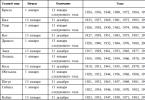Previously, the media reported about a possible deal with links to sources. The companies later made separate statements at Tokyo stock exchange and emphasized that a decision has not yet been made, Bloomberg reported. The boards of directors of each company were expected to discuss the situation on May 12. Earlier, the media reported that Nissan could buy a 33% stake in a competitor, which is now worth about $1.5 billion according to market valuation. Reuters, Nikkei newspapers and The Wall Street Journal (WSJ) called the amount of the discussed transaction at $1.8 billion, or 200 billion yen Negotiations are at an early stage, official press releases said. According to Nikkei and Reuters, we are already talking about the final rounds of negotiations. According to Bloomberg sources, several other companies are also studying the opportunity to buy a stake in Mitsubishi, including Chinese BAIC Motor.
Nissan will become the largest co-owner of the competitor company, WSJ notes. When Nissan gets more than a third in Mitsubishi, according to Japanese laws he will have veto power over major decisions regarding the company. The publication believes that in general the deal will entail a restructuring in the Japanese automobile market, where eight automakers currently operate. The deal will give Nissan a chance to expand its presence in some Asian markets where its cars are poorly represented, while Mitsubishi, which has a strong position in Asia, will be able to benefit from growing Nissan shares on the North American market.
20 April Mitsubishi Motors admitted that its employees, when conducting tests, underestimated the fuel consumption data of cars. Inconsistency between declared and real indicators fuel consumption were detected by Nissan, for which minicars were produced, the company reported. Mitsubishi Motors then admitted that it had been miscalculating fuel consumption for 25 years.
Nissan and Mitsubishi Motors have a joint venture, NMKV, developing minicars under the two companies' brands, and the companies will expand their current partnership, Nissan said. Sales of these models were suspended at the end of April after a scandal involving falsification of fuel consumption data began. Masuko told reporters on May 11 that his company wants to maintain its partnership with Nissan. He also said the company has enough cash to cover costs associated with the fuel economy scandal. At the same time, Mitsubishi announced that it would not ask for help from the Mitsubishi Group companies - Mitsubishi Heavy Industries and Mitsubishi.
Collaboration with Mitsubishi to develop and produce minicars is very important for Nissan, since the segment accounts for about 40% of sales local market. Nissan refused own business minicars crawling joint venture with Mitsubishi in 2010
Even more important for companies may be the ability to pool resources to develop electric vehicles, a technology in which both car companies placed at the center of the growth strategy. "It's an easy way to get positive results," Kurt Sanger, lead auto analyst at Deutsche Securities, told Automotive News. - In the end, it's much more than Japanese market minicar."
Amid reports of fuel consumption fraud, Mitsubishi Motors shares fell by about 45%. These securities were not traded on May 12, Reuters notes. According to WSJ, Nissan shares fell 2.4% on Thursday morning on information about a possible deal. According to analysts, Mitsubishi will have to spend about $1 billion on compensation to buyers of minicars in Japan and return tax benefits and overhead costs.
Nissan investors may have to wait for clarification on the terms of the deal, which will relate to the risks and consequences of the fraud scandal, expert Joe Phillippi from AutoTrends Consulting commented on the negotiations to Bloomberg. In his opinion, because of this, the deal will have an unusually large number of stipulated conditions in case of any possible complications, and all this will affect the price that the buyer offers.
Bye largest shareholder Mitsubishi Motors includes Mitsubishi Heavy Industries, which owns about 20% of the automaker, Mitsubishi Corporation owns 10%, and Tokyo-Mitsubishi UFJ Bank owns about 4%. Mitsubishi Group companies rescued the automaker in 2004 by purchasing its preferred shares after the dissolution of its partnership with DaimlerChrysler. About two years ago, the automaker repaid the companies' debts, but the three of them retained a total of about 34% in Mitsubishi Motors.
Nissan's largest partner is Renault, which owns 43% of the voting shares in the Japanese automaker. Nissan, in turn, controls a 15% non-voting stake in Renault.
Reliability.
- The cost of ownership and maintenance is minimal. 1.5 liters of oil in the gearbox for the entire service life. Antifreeze and brake pads up to 150t.km. Brake fluid according to regulations
- Availability of spare parts and service information. The most common electric car in the world. Suspension from Nissan Juke
- Low consumption. In summer 5-9 km per 1 kWh. Enough for 80-140 km.
- Acceleration dynamics are like a 2.5L internal combustion engine. Excellent braking and handling with a low center of gravity
- Quick readiness for movement. There is no need to warm anything up. The stove immediately blows warm air
- Comfort of movement in absolute silence and without the smell of fuel
- Charging current 15A from any 220V socket with grounding
- There is a Chademo port for fast charging up to 80% in 30 minutes. But such storage facilities in the country can be counted on one hand
- Can be charged while in tow
- Many options for low cost when buying a used one from Japan. Heated all seats and steering wheel, rear view camera, LED headlights, Cruise control, keyless entry. There are configurations with all-round cameras and BOSE music
- Convenient user interface. Pairing with a smartphone via BT. Ability to set timers for charging and climate control
Battery aging is 1-5% per year. Depends on operating conditions. Doesn't like overheating
- The actual available capacity of my battery (SOH 77.5%) is about 16.5 kWh
- Low mileage in winter due to the power consumption of the interior heater hair dryer up to 5 kW. In the Siberian cold, the mileage in traffic jams is only 40 km.
To get mileage like in summer, you need to install Webasto and battery heating
- Inconveniences to use very coldy without a garage and additional insulation of the battery. On Japanese cars There is no battery heating. If the sealed battery cools down to -19 degrees, the car will not start.
- Fully charged from 220V for 5-6 hours. In winter it charges more slowly.
- Dashboard in Japanese. There are translations online. There are services for alteration in English. and even Russian.
- When buying secondhand, it is very difficult to assess the condition of the most expensive part - the battery, because... readings and mileage are rewinding
- Requires constant access to a 220V outlet
- The need to plan long-distance routes
- Poor infrastructure charging stations. Pure city car
- Suspension only for driving on asphalt. Large overhangs and relatively low ground clearance of 16cm
- There is no official service in the country
There is a burning smell in winter when the fan is running at speed 1. The interior heater fan burns out due to poor ventilation.
I drove 7000 km in a year. There are no breakdowns. The total remaining battery capacity of the SOH decreased by 1.5% to 77.5%.
Any car should suit the owner’s needs, views and tastes. I hope you enjoy your cars as much as I do mine. (WITH)
The Renault-Nissan alliance is now called Renault-Nissan-Mitsubishi. Carlos Ghosn announced this today at a presentation new strategy, designed for six years - until 2022. The name of the company Mitsubishi Motors (MMC), of which the alliance has a 34% stake, is included in the official name, and the logo with two yellow-red lines is transformed into a certain geometric figure with three peaks.
Old alliance logo
However, this is more of an advance. The official organizational structure on the alliance website has not undergone any changes: Mitsubishi is subordinate to Nissan, which organizes the group on a parity basis with Renault (50/50%). Moreover, the company responsible for the work of the alliance, registered in Amsterdam, is still legally called Renault-Nissan B.V.

Structure of the Renault-Nissan-Mitsubishi alliance
As for the keynote speech itself, Carlos Ghosn first of all recalled that in the first half of 2017, the alliance took first place in the world in car sales: 5 million 270 thousand cars and light commercial vehicles. The plan is to increase annual sales to 14 million vehicles and revenue to $240 billion by 2022, compared to last year’s $180 billion.

Carlos Ghosn
To this end, the alliance companies will release 40 new models, of which 12 will be purely electric, and one will be completely autonomous. Thanks to the introduction of a common electric cart and platform for mid-size cars, the number of cars built on shared modular platforms will increase from two to nine million per year. By 2020, access to common modular platforms Mitsubishi will also receive: the total cost savings from the alliance should be $11.9 billion.
These are the goals as a first approximation. More detailed and specific plans will be announced at conferences of each of the alliance members. By right of seniority, Renault will be the first to hold such a meeting on October 6.
May 19th, 2016
The transaction can be assessed in different ways. Considering Nissan dimensions, it would be more correct to call what is happening a takeover, but the experience of other auto alliances shows that such a clumsy method does not give top scores. A soft partnership, as in the case of the Renault-Nissan alliance, is much more promising. Let's figure out what Nissan, Mitsubishi and Russian buyers will benefit from this limited alliance.
Nissan, let me remind you, is buying a 34% stake in Mitsubishi for $2.2 billion. Officially, this is called a "long-term strategic alliance." It is reported that Nissan and Mitsubishi Motors Corporation agreed to cooperate in procurement, development of common technical platforms, technology exchange, joint use of factories and development of a common strategy for action in emerging markets.
According to Japanese laws, 34% of shares is a lot, the so-called blocking stake, which allows you to prevent the implementation of any decisions that do not suit the shareholder. In many cases, such a package is sufficient for full control over the company, but Mitsubishi has other major shareholders who own approximately the same number of shares. Let me remind you that Mitsubishi used to be a huge business empire, which after the end of World War II was divided into 44 industry companies, Mitsubishi Motors is only one of them. However, ties between the firms have remained intact, and they continue to hold each other's shares. Thus, a large stake in MMC belongs to the giant Mitsubishi Heavy Industries Ltd, and the total stake in Mitsubishi Motors, owned by the fragments of the Mitsubishi empire, is estimated at the same 34%.
Nissan buys Mitsubishi shares for favorable price. More recently, they cost almost one and a half times more, but the company was crippled by a fuel scandal. It turned out that MMC underestimated fuel consumption data, and stock prices collapsed. The company was in serious trouble. Immediately Nissan rode up on a white horse with its billions. This gave rise to evil tongues saying that the scandal was initiated by the main beneficiary of the deal (the companies have been in partnership for five years and have access to each other’s proprietary information).
Why does Nissan need Mitsubishi, a small company by its standards? The fact is that it is small, but in Southeast Asia and especially in Thailand, Mitsubishi’s position is much stronger than that of its older partner. In addition, the Mitsubishi pickup line looks more interesting.
The partnership of the Renault-Nissan alliance with Mitsubishi will allow it to more confidently compare production volumes with the leaders automotive market. Renault-Nissan produced 8.5 million cars last year, MMC about 1 million, together they are not so far behind Volkswagen and Toyota, each company produces about 10 million cars a year. The new deal continues the “soft merger” strategy pursued by the head of the Renault-Nissan alliance, Carlos Ghosn.
For Mitsubishi, this partnership means solving financial problems, gaining access to modern technologies, above all, to new engines and great progress in the development of electric vehicles. Also with Renault-Nissan Alliance It will be easier to develop an autonomous driving system without human intervention. To solve all these important tasks Mitsubishi itself simply would not have had enough money. Access to new markets, in which Mitsubishi's position is weak, and Nissan, on the contrary, is strong, cannot be discounted. Fans also hope with the transition under the wing of Nissan to revive the popularity of former legends of the brand, such as Mitsubishi Evolution. About the same BMW concern inhaled new life in MINI.
For Russian buyers the creation of a new alliance is unlikely to change anything in better side. At first, nothing will change at all. In the future, it can be optimized dealer network, however, in the current conditions this is unlikely to affect prices, and one cannot expect a significant change in the level of service either. What about model range, then decisions can be made that are beneficial to consumers at first, for example, the ASX will be returned to Russian market. In the future, judging by the experience of others major alliances, cars manufactured under different brands, With technical point visions become twins; models of the same class differ only appearance, some settings and configurations. Moreover, it is clear that the filling in Mitsubishi will be from Nissan, and not vice versa.
It is expected that the final agreement on the formation of the alliance will be signed on May 24, and all legal formalities will be settled by the end of this year.
Pictured is the Nissan IDS concept. (With) Russian representative office Nissan
Mitsubishi Motors has agreed to sell 34% of its shares to Nissan for $2.2 billion. The deal will be closed before the end of the year amid a scandal involving falsification of fuel consumption test results, which has brought down Mitsubishi's quotes
Nissan will acquire a 34% stake in Mitsubishi Motors, which became involved in the “fuel scandal” due to underestimation of fuel consumption data in technical documentation a number of models, writes the Financial Times. The deal was announced at a joint conference of the two automakers.
The publication notes that the announcement of the agreement comes at a time when Mitsubishi needs funds to survive the scandal.
The deal was worth 237.3 billion yen (about $2.2 billion), it will be closed by the end of 2016, and Nissan will become Mitsubishi's largest shareholder. “We will help this company solve the problems it faces, in particular to restore consumer confidence in fuel economy,” Carlos Ghosn, chief executive of Nissan and Renault, said at a news conference.
Chairman of the Board of Directors of Mitsubishi Motors Osamu Masuko noted that it will be difficult to restore trust. “With Nissan, we will begin to move towards this goal,” Masuko assured.
Mitsubishi fuel consumption for more than 600 thousand. Vehicle 20 April. This led to a drop in the company's shares by 43%.
The company said it had created an independent commission to investigate the incident. Tests, the results of which were fabricated, were carried out on 157 thousand. Mitsubishi cars and 468 thousand Nissan cars. It was Nissan, whose vehicles were also tested by Mitsubishi, who pointed out the discrepancies in the data, after which Mitsubishi conducted an internal investigation and found out that the data had been falsified.
Later, Mitsubishi Motors President Tetsuro Aikawa admitted that the company's fuel consumption since 1991. As Aikawa noted then, the investigation into falsifications continues. The president of the company emphasized that he does not know why his employees decided to engage in falsification.
Previously in Emissions Test Fraud harmful substances admitted Volkswagen company. She is currently negotiating with US authorities over the fines that the automaker must pay for fraud with tests.
According to the filing in January 2016, Volkswagen faces a fine of up to $46 billion for violating environmental laws. In addition, in March, more than 270 institutional investors from around the world filed a lawsuit against the automaker for concealing information about harmful emissions for €3.3 billion. At the end of March, the US Federal Trade Commission filed a lawsuit against Volkswagen.



